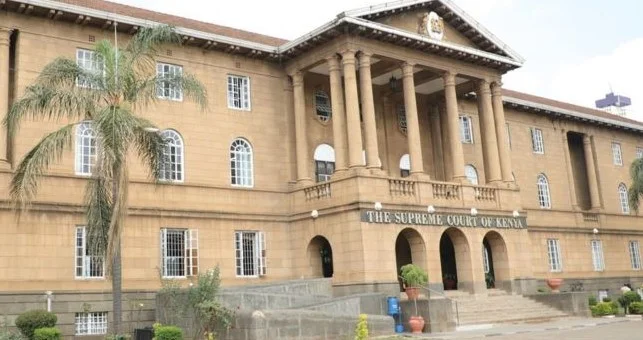
A photo of the Supreme Court of Kenya. PHOTO: The Judiciary
In Summary:
- Supreme Court denies National Treasury’s request to stay the nullification of the Finance Act 2023.
- The ruling leaves a significant gap in Kenya’s national budget, causing economic uncertainty.
On Friday, August 2, the Supreme Court of Kenya rejected the National Treasury’s request for a stay on the nullification of the Finance Act 2023.
This decision exacerbates the fiscal uncertainty already troubling Kenya, deepening the economic instability in the wake of recent legislative upheavals.
The Supreme Court’s refusal to grant a stay means that the Finance Act 2023, previously declared unconstitutional by the Court of Appeal, remains invalid.
This comes at a challenging time for Kenya, which is also contending with the withdrawal of the Finance Bill 2024.
With no alternative revenue plan in place, the government now faces the daunting task of managing a substantial Ksh510 billion gap in the national budget for the current fiscal year.
The Supreme Court’s decision highlights the urgency of the situation, as it scheduled a hearing for the matter during the August court recess.
This swift action emphasizes the gravity of the fiscal crisis and the need for a timely resolution. The court’s ruling requires the Treasury and other relevant parties to submit their motions and responses within a tight timeframe, adding to the pressure on all involved.
The National Treasury had sought a stay to delay the immediate implementation of the Court of Appeal’s decision, hoping to buy time to adjust its fiscal strategies.
The Finance Act 2023, which introduced several contentious tax hikes, including a significant increase in VAT on fuel and new income tax bands, was seen as crucial for the government’s revenue-raising efforts.
Its invalidation has created a significant gap in the fiscal framework, worsening Kenya’s already fragile economic situation.
The ruling has sparked intense debate across the nation.
For many Kenyans, the Court of Appeal’s decision was a rare victory against perceived government overreach. Citizens burdened by increasing taxes celebrated the judgement as a win for ordinary taxpayers.
However, the practical implications of the ruling have left the government scrambling for solutions.
The Treasury argues that the Finance Act 2023 was essential for meeting its revenue targets, and its nullification could result in a loss of approximately Ksh164 billion, significantly impacting the government’s ability to fund essential services and infrastructure projects.
The stakes are undeniably high. The Finance Act 2023 was designed to address Kenya’s mounting fiscal pressures through increased taxation, including doubling VAT on fuel from 8% to 16% and introducing new income tax bands for high earners.
These measures aimed to boost government revenues, but their unpopularity, coupled with recent court rulings, has disrupted the administration’s financial plans.
As the country awaits the Supreme Court’s final ruling on the appeal, the government must navigate a complex landscape of fiscal uncertainty.
Experts suggest that, without the Finance Act 2023, the administration may revert to the Finance Bill of 2022, but this would not fully address the revenue shortfall.
The transition could also face significant challenges, given the evolving economic context and the need for legislative adjustments.
